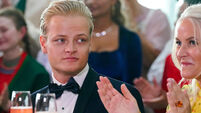Russian Dilemma
Protesters hold a portrait of Vladimir Putin as they march against alleged vote rigging in parliamentary elections in Sakharov Avenue in Moscow, named after Andrei Sakharov, who addressed the People’s Congress as Soviet President Mikhail Gorbachev looks on in 1989. The poster makes a reference to Putin’s remarks that he mistook white ribbons worn by protesters for condoms.
Tsarism may have been the most repressive regime of its time in Europe, but Lenin’s Soviet Union was far more violently repressive
















